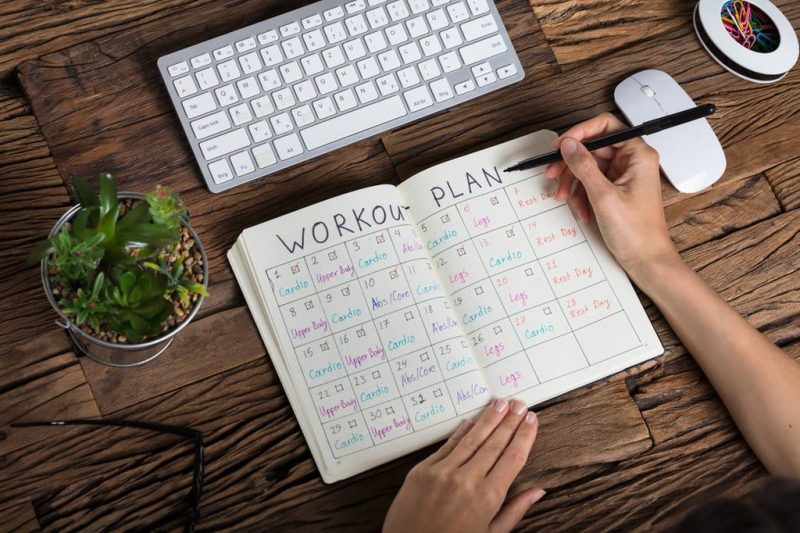
Making New Year’s resolutions has become a popular tradition in the West; what better way to start making changes in your life than a new year when you can have a clean slate? The most popular topic of these resolutions is a healthier lifestyle, which can include things like changing your diet or being more physically active.
Unfortunately, these “resolutions” are, in a way, idealistic. Most people who make resolutions at the end of the year either give up on them after messing up once or outright forget that they even made them in the first place.
Don’t treat change like a challenge. Instead of focusing on resolution goals and being strict about them, why not work on developing smaller habits to reach long-term goals?

Why do resolutions often fail?
New Year’s resolutions are often rigid and broad, being made with no consideration towards potential obstacles that you might not foresee before the new year. Without both this foresight and flexibility to work around those, people will often lose motivation after just one month of no progress. In other words, people only focus on a hypothetical end result without actually considering how they’ll get there.

Why you should replace resolutions with habit development
Instead of trying to focus on a broad end result, it is better to work on developing smaller, healthier habits. Not only will this make it somewhat easier to see progress toward a personal goal, but these habits will likely stick around for several years if enforced effectively.
Say your New Year’s resolution is to lose 50 pounds throughout the new year. That alone can seem like a daunting task, especially if you haven’t figured out realistic ways to reach it.
However, let’s say you commit to habits that contribute to weight loss, like exercising a few times a week and eating more protein. This will be much more effective and achievable than just setting an end goal.

What is the 90/10 rule?
Of course, even with these habits, being flexible enough to work around potential obstacles is important. Focusing 100% of your effort towards change all the time with no consideration for life’s unpredictability is both unrealistic and unhealthy. This is where the 90/10 rule comes in.
Under this rule, you should be able to make progress 90% of the time while allowing yourself a break 10% of the time in the event life gets in the way or you simply forget to do something on your to-do list. If something happens, you will still have hit your 90% goal and be motivated to keep going rather than quitting because you messed up once.

Habits to work on for fitness goals
Make exercising fun for you
If you strictly stick to the same workout routine of endlessly lifting weights and running on treadmills at the gym and you don’t enjoy it, you’ll eventually get bored of it and lose motivation. Fill your typical exercise routine with physical activities that you enjoy, such as running, cycling, or even dancing.
Keep a progress journal
At the end of each workout session, jot down quantitative statistics such as how many reps of each exercise you did or how much weight you lost between sessions. Not only can this show you how much closer you are to your goal, but it can also help you determine how to improve your workout routine to make even more progress.
Try to be consistent
Although variety is important to maintain motivation, consistency in some aspects is still key to better results. This means doing the same number of reps of certain exercises and keeping each workout session the same amount of time. It is okay to change certain parts of it if something doesn’t seem to be working as much as you thought it would, but don’t just jump to strictly aerobic exercises after weeks of resistance training.

Habits to work on for financial goals
Create and maintain a budget
Whether it is for buying exercise equipment or for groceries, it is important to have a budget of how much money you should be spending within one week or one month. This can help you save money, be mindful of how much you spend, and prevent you from breaking the bank on impulse purchases.
Check account balances regularly
Taking a few minutes each day to check your bank accounts through phone apps can help you stay aware of your financial situation and spot any potential issues, such as surprise charges and extreme balances. Looking at your account daily can also help you review your past spending habits and determine if you need to lower your budget.
Pay bills and recurring payments on time
Setting up reminders on your phone a few days before you need to make payments for anything can help you get a good credit score and avoid interest rates that can get in the way of your financial goals. You can also set up on-time auto payments through certain programs if you have trouble remembering due dates.

Habits to work on for relationship goals
Practice open communication
Whether with friends, family members, or lovers, communication is key in any type of relationship. Practice being more concise with your words instead of “beating around the bush,” and be open to talking about more serious topics when appropriate to do so. At the same time, be considerate and attentive to others when they speak to understand them better.
Establish, enforce, and respect boundaries
Be open to talking about boundaries and expectations in respecting them, especially when it’s with a romantic partner. When it comes to your boundaries, be firm and assertive in enforcing them, and don’t try to “compromise” if something makes you uncomfortable.
When it comes to the other person’s boundaries, learn to recognize both through nonverbal and verbal cues when they’re starting to get uncomfortable with what you’re doing, and don’t push them just to have your way.

Habits to work on for self-development goals
Practice gratitude
Sometimes, it can be disheartening to see progress coming along slower than you expected. Instead of dwelling on how you haven’t reached your bigger goals, learn to appreciate the effort you put into achieving smaller milestones. It also helps to regularly express gratitude towards those who help you towards your goals; you likely couldn’t make progress without their support!
Take time to reflect
When you’re alone and have some free time, take some time to quietly reflect on how you’ve been doing the past few weeks, as well as how your actions have affected others’ perceptions of you. This can help you praise yourself for things you’ve done right, as well as find things that you could work on further to benefit yourself and make progress towards your goals.
Take initiative
True change can only start with you. If something is bothering you and it’s in your power to do something about it, then make it a habit to solve the problem if you can instead of waiting around for someone else to fix it. And if you feel you can’t do something alone, actively seek out help instead of waiting for someone to offer it to you.


